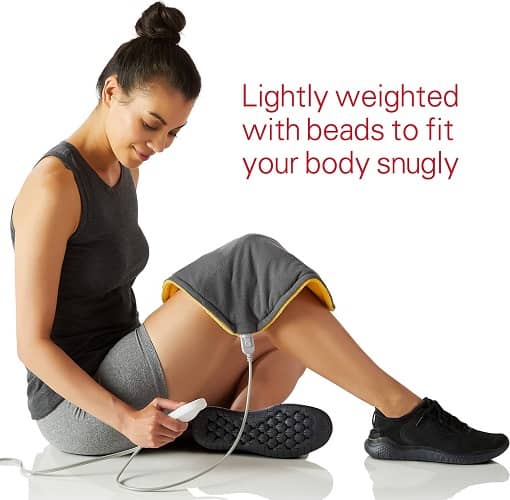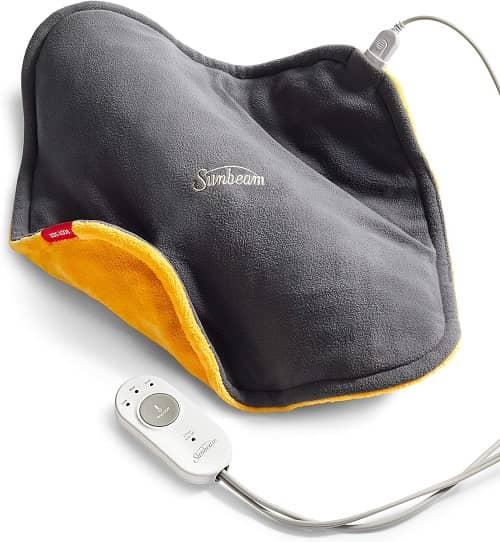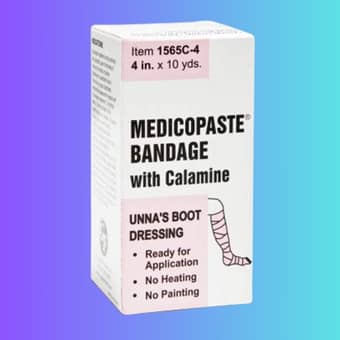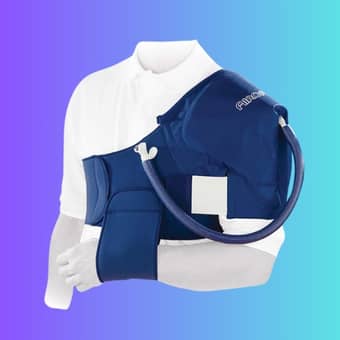Do you have knee pain? Does it limit your mobility and affect your daily routine? Using a knee heating pad can be a game-changer for you. You may have arthritis, strained muscles, or general discomfort. The heat of a heating pad can soothe you and boost blood flow. It can also promote healing. This guide will show you the benefits of using a knee heating pad. It will help your knee health.

Table of Contents
- I. Understanding Knee Health
- II. Types of Knee Heating Pads
- III. Factors to Consider When Choosing a Knee Heating Pad
- IV. Tips for Using a Knee Heating Pad Effectively
- V. A Step-by-Step Guide to Using a Knee Heating Pad
- VI. Pros and Cons of Using a Knee Heating Pad.
- Improve your quality of life with a knee heating pad.
- FAQ
Key Takeaways:
-
Knee heating pads reduce pain and discomfort. They help with pain and discomfort from knee injuries or arthritis.
-
A knee heating pad can improve blood flow. The heat it gives off can help promote better circulation in the knee area. This can aid healing and reduce inflammation.
-
A knee heating pad can improve knee flexibility and mobility. It makes it easier to do daily activities and exercise.
I. Understanding Knee Health
1.1. Common Knee Problems and Injuries
You may not have had knee issues before. But, you should know about common problems like osteoarthritis, tendinitis, and ligament injuries. These issues can cause pain, swelling, and limited mobility. They affect your daily activities.
1.2. Importance of Knee Health Maintenance

You must maintain your knee health. This prevents injury and keeps you mobile. Regular exercise, staying at a healthy weight, and using supportive gear can keep your knees strong. They will also stay flexible. For example, gear like knee heating pads can help.
II. Types of Knee Heating Pads
If you are considering using a knee heating pad to improve your knee health, you need to know about the types available. Here are the various types of knee heating pads that you can choose from:
| Electric Knee Heating Pads | Microwavable Knee Heating Pads |
| Chemical-Based Knee Heating Pads | Infrared Knee Heating Pads |
An electric knee heating pad is convenient. It provides steady heat therapy for your knee. This helps with pain relief and healing. These pads are easy to use and often come with adjustable settings to suit your comfort level. You prefer a controlled and constant heat source. Electric knee heating pads are a great choice. Another popular option for knee heat therapy is heating pads that you can heat in the microwave. Plus, microwavable knee heating pads are reusable and offer flexibility in heat settings. These pads are often filled with natural grains or gel. They keep heat for a long time and provide soothing warmth to your knee. You prefer a more natural and heat-retentive option. Microwavable knee heating pads are right for you. Chemical-based knee heating pads are disposable. Yet, they are handy for single-use heat therapy on the go. Heating up when exposed to air, these pads offer quick relief for sudden knee pain or discomfort. They are portable and easy to activate. Chemical knee heating pads are handy for immediate heat therapy. One of the latest innovations in knee heat therapy is the use of infrared knee heating pads. Knee heating pads use infrared technology. They penetrate deeper into the tissues. This promotes better blood flow and faster healing. If you want a better heat therapy option, infrared knee heating pads can help. They can provide targeted relief for your knee pain.
III. Factors to Consider When Choosing a Knee Heating Pad
Regular heating pads cannot do this. Crafters design knee heating pads to target this area. They target the knee for the greatest comfort and relief. When choosing the right knee heating pad for your needs, consider several factors. They will ensure that you get the most out of your purchase.
-
Size and shape.
-
Heat settings and temperature control.
-
Material and comfort.
-
Portability and ease of use.
3.1. Size and shape.

Some knee heating pads are adjustable and can fit various knee sizes. Make sure the pad you choose can cover the entire knee area to provide effective heat therapy.
3.2. Heat Settings and Temperature Control
On a knee heating pad, heat settings and temperature control are crucial. They ensure personalized comfort and effective therapy. Here is a breakdown of what to look for:
| Heat Settings | Temperature Control |
| Multiple heat settings allow you to adjust the intensity of the heat therapy. | A pad with temperature control lets you set the exact level of heat you prefer. |
3.3. Material and comfort.
Heat control is important for a knee heating pad. It determines the level of heat and comfort during therapy. Look for a pad made of a soft, breathable material that feels comfortable against your skin.
3.4. Portability and ease of use.

Portability and ease of use are key factors. They can make a big difference in how easy it is to use your knee heating pad. Look for a light pad. It is easy to move around with and simple to use. You can incorporate heat therapy into your routine with minimal effort.
IV. Tips for Using a Knee Heating Pad Effectively
4.1. Pre-Heating Pad Preparation
Now, before using your knee heating pad, it’s imperative to ensure that your skin is clean and dry. Remove lotions and oils from your skin to allow heat absorption.
4.2. Proper Application and Placement
Preparation is key when it comes to using a knee heating pad. Study the directions with attention. Place the heating pad on the area of your knee that hurts. Avoid placing it on any open wounds or sensitive areas.
4.3. Duration and frequency of use.
With a knee heating pad, it’s important to use it in moderation. Avoid using it for more than 20 minutes at a time, with at least a 2-hour break between sessions. Overuse may result in skin irritation or other complications.
4.4. Combining with Other Knee Health Practices

Also, using a knee heating pad, other knee health practices help too. These include gentle exercises, proper rest, and ice therapy. They can enhance the benefits. A holistic approach to knee care can help improve your knee health and speed up recovery.
V. A Step-by-Step Guide to Using a Knee Heating Pad
Many people find knee heating pads helpful. They are good for managing knee pain and improving knee health. Apply a knee heating pad at the right time for the best outcome. Apply a knee heating pad with these clear and easy-to-follow directions.
| Before You Start | Applying the Heating Pad |
| Guide: Make sure your skin is clean and dry before using the heating pad to avoid any skin irritation. | If: Plug in the heating pad and adjust the temperature according to your comfort level. |
5.1. During Use
Heating: Position the heating pad over your knee and secure it in place with straps or wraps. Relax and let the heat penetrate your knee to soothe any discomfort.
5.2. After Use

After using the heating pad for the recommended time, unplug it and remove it from your knee. Spend a short time working your fingers over your knee. This will boost blood flow and relax the muscles.
Remember: After using the heating pad, give your knee time to rest. Avoid hard activities that may strain the knee. Its benefits unfold, fostering knee healing.
VI. Pros and Cons of Using a Knee Heating Pad.
| Pros | Cons |
| Provides targeted pain relief | Possible skin irritation with prolonged use |
| Improves blood circulation | Overuse may lead to dependency |
| It relaxes muscles and reduces stiffness | May not be suitable for certain medical conditions |
6.1. Benefits of Improved Blood Flow and Relaxation
It eases pain. It also improves blood flow and relaxes muscles. These are the key benefits of using a knee heating pad.
6.2. Drawbacks of overuse and skin irritation.
Knee heating pads can provide relief. Yet, using them too much may lead to dependency. Additionally, they can irritate the skin.
The heat increases blood circulation. However, be cautious of issues such as dependency and skin irritation. When using a knee heating pad, moderation is crucial to prevent these drawbacks.
6.3. Potential Interactions with Medications

If you are on any medications, it is crucial to know about potential interactions. A knee heating pad may interact with them.
A knee heating pad can affect how your medications work. So, it’s best to ask a healthcare professional about any interactions. They can ensure your safety.
6.4. Comparison to Other Knee Health Solutions
| Knee Heating Pad | Other Solutions |
| Targeted pain relief and improved circulation | Medication, physical therapy |
| Convenient and easy to use at home | Surgery, injections |
For instance, a knee heating pad offers targeted relief and better blood flow. However, medication and therapy may be better for your knee. They can provide more complete care. It’s important to consider all options and choose the one that best suits your situation.
Improve your quality of life with a knee heating pad.
Knee health boosts with knee heating pad use, as these factors show. It can help you prevent injuries. It can also help with knee pain and arthritis. A knee heating pad provides targeted heat therapy. This therapy boosts blood flow, reduces inflammation, and eases pain. Buying a knee heating pad is simple. It’s a great way to take care of your knees and improve your life.
FAQ
Q: Is it beneficial to use a knee heating pad for improving knee health?
Knee heating pads can help blood flow to the knee. They also reduce stiffness and aid healing after an injury or surgery. The heat can also relax muscles. It can reduce pain from conditions such as arthritis or overuse.
Q: How often should I use a knee heating pad to see the best results?
Experts recommend using a knee heating pad for 15-20 minutes at a time. Do this several times a day.
Be sure to follow the pad’s instructions. This will help you avoid skin irritation or burns.
Q: Can you use a knee heating pad along with other treatments for knee pain?
Yes, you can use a knee heating pad with other treatments. These include physical therapy, medicine, and icing. Using a mix of treatments can enhance your knee pain plan. It will help make it more effective.
Last Updated on August 16, 2025 by Holistic Healths





